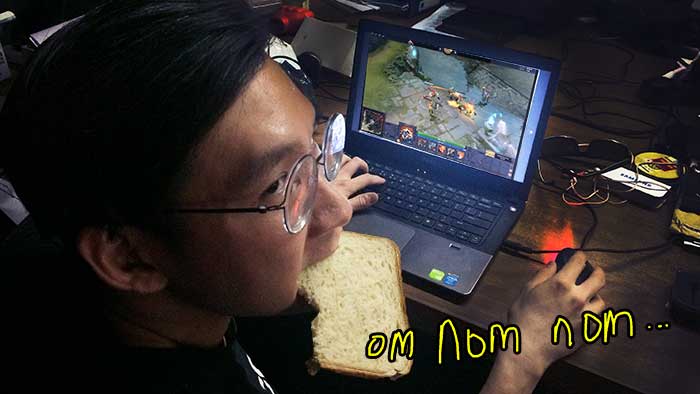Expectations VS Reality: Malaysians share painful truths about their jobs

- 932Shares
- Facebook793
- Twitter14
- LinkedIn23
- Email19
- WhatsApp83
“Be a doctor!” “Be a lawyer!” “Start your own business!”
These are the common words every Malaysian child has heard, along with other humbling statements meant to motivate you from parents who aren’t familiar with the concept of positive reinforcement.
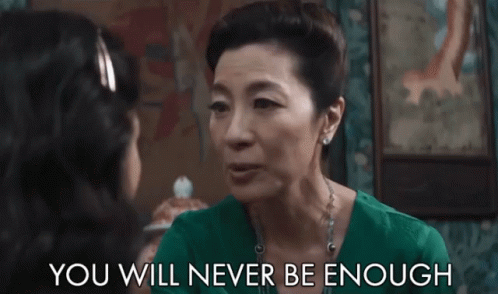
Years of being indoctrinated with ideas of “good” professions may have also inadvertently given us a grossly overestimated idea that all lawyers drive Jaguars and all doctors walk through the hospital corridors in slow motion as nurses look upon them in awe.

It’s probably safe to say that most of y’all didn’t masuk these professions, so you might wonder… what’s it actually like being in these occupations?
Well, our friends from AIA Malaysia wanted to help shed some light on the situation, so we spoke to…
- Dr. Aaron Cheah (Doctor)
- Fahri Azzat(Lawyer)
- Jinli Chan(Entrepreneur); and
- Cindy Wong (Insurance agent)
… and asked them for their experience in terms of money, work-life balance, and whether or not the reality matched their own perceptions.
A doctor’s life is chaotic (but pays well)

Both a practicing doctor and Director of Clinical Services at Speedoc, Dr. Aaron tells us that he expected a doctor’s salary to be “good” but the reality actually exceeded his expectations. He puts the starting salary at RM4k – RM5k, but he was pleasantly surprised to find himself earning RM10k – RM15k when he moved to the private sector.
He also added that seniority and specialization can further bump the salary up, and some specialists can earn around 10 times a normal doctor’s paycheck. However, high pay doesn’t always have to be in the form of money:
“If you’re doing it out of passion, out of helping another person who is in need… I think that is more than enough payment.”
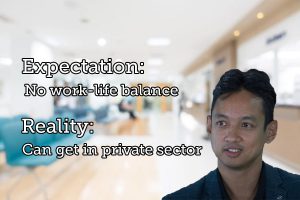
On work-life balance though, you can forget about that as a houseman. You can expect to wake up at 5am, get to the hospital by 6:30am, finish work around 7pm – 10pm, go home and immediately fall asleep once your head hits the pillow. Rinse and repeat that for 2 years.
Dr. Aaron adds that he and a lot of doctors he knew developed the unhealthy “super power” of sleeping for just 1 or 2 hours and feeling completely refreshed. So ironically, being a young doctor ends up taking a toll on your health:
“I started to put on weight, got a tummy and all that. So I did suffer for 2 years”
On the bright side, you have the option of leaving the service after the housemanship; where you can explore other outfits like starting your own clinic or becoming a specialist – giving you more control over your work-life balance. These days, Dr. Aaron works from 9am – 6pm, with the occasional weekend event to attend.
“[Now] I have more time for self-care. More time for fitness, to take care of what I’m eating instead of just grabbing whatever from the hospital cafeteria.”

Dr. Aaron thought he knew what working in a hospital would be like from visiting sick relatives, but no amount of visits could have prepared him for the chaos in the wards.
“You are one person taking care of a ward [with 40 or 50 patients]. So you’re overworked, with lots of pressure.”
He also says the experience is dependent on the senior doctors guiding you – sometimes you get seniors who are amazing teachers and sometimes… not.
“When you’re exhausted and someone tells you you’re not meant to be a doctor, of course it mentally affects you. I think that’s one of the main reasons why young doctors go into depression.”
These days though, Dr. Aaron says that there’s a more robust support system in place compared to before, and doctors experiencing stress can visit their hospital’s psychiatry department for help. But then again, the issue of contract doctors is still a hot topic in Malaysia. So despite this being a very noble career, one has to be willing to make a lot of sacrifices.
A lawyer’s life is more unpredictable than you’d think
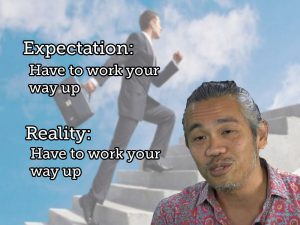
24 years ago, Fahri’s starting salary as a lawyer was RM1,800. But, growing up with his lawyer dad, he knew what the expectations were:
“You come in low, but you work hard. You rise up, you do the right cases, and eventually you’ll get there.”
And get there he did. Today, Fahri runs Fahri, Azzat & Co., his own law firm where he pulls in a pretty comfortable paycheck.
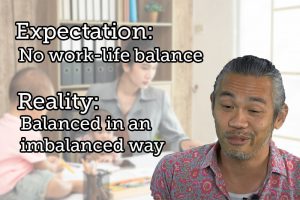
While justice might be equal, a lawyer’s work-life balance is not. As an apprentice lawyer, Fahri said it wasn’t uncommon for him to look up from his documents only to realize it was already dark outside.
Things got even more imbalanced in 2008, when newly-appointed Chief Justice Tun Zaki initiated reforms to speed up the justice system. Before 2008, a simple case could take up to 4 years to be heard in court but, after the reforms, even complex cases had to be completed in 9 months.
Fahri and the post-2008 generation of lawyers are used to the pace now, and he describes his work-life balance as balanced in an imbalanced kind of way.
“Sometimes I prioritize my family, so they take precedence over my work. And sometimes my work takes precedence over my family and my passions. I would say it’s balanced in an imbalanced kind of way.”

Fahri grew up with the idea that a lawyer’s life is going into the courtroom in a suit and presenting arguments in front of a judge. And, for a while, that was true.
These days though, digitalization has also made its way into the courts:
“It’s a strange moment, especially for somebody who’s used to the manual and old ways. There are no physical courts, no physical documents… everything is digital.”
However, Fahri did say there was a harsh reality that he never expected to face: Constantly chasing clients for payment. Same here, Fahri. Same here.
An entrepreneur’s life is like being your own kuli
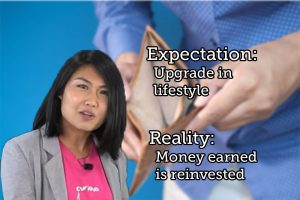
Jinli used to earn a 5-figure salary in her corporate job. Since founding Cocova, a chocoholic’s dream store, 3 years ago; her salary has become… 4 figures. In fact, she hasn’t upgraded her phone in years because most of her money is reinvested back into the business.
“Of course I can easily pay myself a 5-figure salary, but that would take a toll on my business.”

Jinli says that the biggest misconception people have about running your own business is that your hours become more flexible, escaping the grind of being another cog in the office machine.
“Part of it is true, I do have flexibility. This also means work is 24/7 lah. Weekends! At night!”
Things can get better though. At one point, Jinli started to suffer from hypertension due to the stress and anxiety of running a business. But now that the business has grown enough for her to hire a team, she can afford to rest when she needs to.

Jinli went from a glamorous corporate office to a living room full of inventory. It was also a transition from a comfy air-cond environment to a sweaty one, because she had to carry all the stock by herself (chocolates are heavy!).
“Everyone calls me boss lady, but I’m really more of a kuli.”
But the freedom that comes with running your own business does manifest in different forms. For instance, Cocova has grown enough for Jinli to relocate to a full shoplot office, where she can truly build a space of her own:
“This is the environment that I get to build for myself and my team… part of the satisfaction comes with that. It’s kind of like my second home, so I get to decorate it however I like.”
An insurance agent’s life is more than “go yumcha with client”

As a chartered accountant, Cindy was once faced with the tough choice between going to Singapore and earning a $7,000 a month or selling insurance. She wanted to go where the money was and decided to become an AIA Life Planner (what AIA calls their agents).
And it looks like she made the right choice, earning a 5-figure commission in her first month alone.
“I joined because of the money, and in a very short time, the income that I get is far above my expectation.”
According to Cindy, AIA gives up to RM9k in additional monthly bonuses for fulfilling certain KPI. Hence, getting a 5-figure monthly income is very achievable early in this career, as opposed working your way up for 5-10 years in corporate jobs.

Cindy’s initial idea of an insurance agent was actually seeded by the aunty who sent her down the path of a Life Planner, with the impression that it involved a lot of yumcha and chitchat. But she found out the job was actually super fast-paced, especially in the first year.
“[The aunty was] like, “Join this career, free up a lot of time wan. You can plan your own time, go drink coffee, chit chat, and close case.”
In reality, it’s actually hectic, but we determine how hectic we want it, because we want all the sales coming in, you know?”
Three years in, Cindy’s schedule now includes managing a team of 6 Life Planners – though she adds that she’s now stable enough to work for 9 months and rest for the remainder of the year.

Being that insurance is sales-driven, Cindy expected to see a bunch of really stressed out agents on edge over their sales numbers. With no sales experience, she thought her situation would be far worse off.
But when she joined the AIA Elite Academy, a specialised training program for insurance agents, she was surprised at the amount of direct support she received:
“The program actually gets people from all walks of life. There are doctors and engineers venturing into this industry. We have specific trainers to contact through Whatsapp and everything because we’re new to sales.”
And yes, she also had to deal with family and friends who saw her career choice as a bit of a downgrade, but says that they now understand the industry more and are proud of what she’s achieved.
There are pros and cons to every job (tell that to your parents!)
Like all our interviewees discovered in their respective jobs, the reality may not be as glamorous as we were led to believe. The signs of success that most of us see are the results of many years of hard work and sacrifice… just like any other job.
Our friends at AIA Elite Academy understand that people may be drawn to start a career in insurance because of the attractive potential income. But they also want to bridge the gap between expectation and reality, and give new joiners the best, realistic chance for success.
Whether it’s a career change or a fresh start, the AIA Elite Academy helps prepare you for the insurance industry through an 18-month structured training program. Here, you’ll learn about professional technical knowledge for the job, and get support through weekly sharing sessions among peers, dedicated trainers, as well as best practices sharing sessions.
Best of all, you have options. The Elite Lite program lets you dip a toe in to test the waters; while the Elite & Elite Pro programs let you jump straight in. Check out the chart below or click this link to find out more about the AIA Elite Academy.
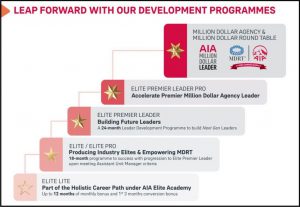
So if the program looks interesting to you, give it a go! There won’t be any scary seniors putting you down. Really wan.
- 932Shares
- Facebook793
- Twitter14
- LinkedIn23
- Email19
- WhatsApp83


